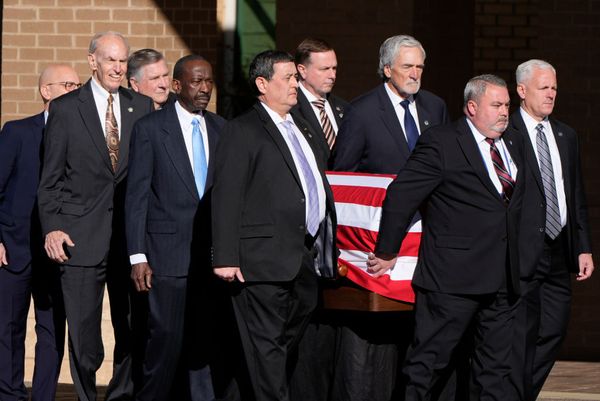
The taxi driver who took me from the Philadelphia Airport to my apartment was a Sudanese-American man who had recently become a US citizen. He was still waiting for his wife to join him in the US. Having been displaced by the civil war that has riven their home country since April 2023, his wife was now living in a refugee camp in Uganda.
Perhaps you’ll think me naive, but I couldn’t contain my surprise when he told me he was going to vote for Trump. “I like Trump more than I like Harris. He talks like ordinary people, and I think he will be better for people like us.”
The next time I caught a taxi in Philly, I again spoke to my driver — this time, a man who had come to the US from Burkina Faso. I was no longer as perplexed when he disclosed he would also support Trump. Back in Burkina Faso he had been a school teacher. The reason he and his friends in the Western African community in America preferred Trump was different from the Sudanese-American driver — they thought Trump would “fix many problems in the world”.
My emerging understanding of Trump’s popularity was reinforced when I later interviewed Chinese Americans in Flushing, a neighbourhood in the New York City borough of Queens. I was initially incredulous that many people in this community would root for someone who had dubbed COVID-19 the “China virus”, and whose irresponsible rhetoric had caused widespread anti-Chinese and anti-Asian hate and racism across the country during and after the pandemic.
But then they told me of their grievances about feeling “wedged” in the nation’s affirmative action initiatives, which, in their minds, privileged the children of other racial minorities such as Black and Latinx communities at the expense of their own children. They were apparently unaware that the US Supreme Court had banned race-based affirmative action nationwide for college admissions in June 2023, and a growing number of states had either implemented across-the-board bans or reversed or failed to pass such measures.
They also told me they could not accept the Democrats’ progressive values behind tolerant school policies that supported transgender students and provided social welfare to undocumented immigrants who, they believed, were “living on government hand-outs”.
Similarly, Trump’s and his supporters’ abusive and insulting language directed at undocumented immigrants — especially those from Latinx countries — did not seem to stop him from gaining popularity among people in these communities, especially those who had come to the US empty-handed and had worked hard all their lives to get to where they were today.
Olga Franco originally came from Peru 34 years ago. She voted for Biden in 2020, but decided to vote for Trump this time, despite the fact that her sister is still an undocumented immigrant in the US. “We need a change. I hope I am not wrong,” she said in an interview with the multilingual non-profit media outlet Documented. She also told the outlet: “My sister does not have papers and she has never relied on the government like those benefits that [the new arrivals] have … I am against the people that are doing bad towards the country.”
Also speaking to Documented, Rosemary Castro, who left Ecuador for America 15 years ago and now lives in Queens, supported Trump because she wanted to see a government that would be tougher on crime. She believed the current administration had let in too many new immigrants (many of whom were, like her, from Latinx countries). According to Trump and his media allies, the arrival of many such immigrants has led to a spike in crime. This flies in the face of ample inconvenient evidence that crime rates continue to fall dramatically in NYC and across the nation, according to both the FBI and the Bureau of Justice Statistics, including as recently as the first six months of 2024.
While the voting choices made by these individuals may seem to defy reason, even self-interest, they mostly appear to derive from a deep dissatisfaction with certain aspects of the status quo, and an unfounded hope that a different government, whoever its leader may be, would fix the problem.
The biggest problem facing almost all Americans is the cost of living. You only have to shop in a supermarket in any US city to appreciate how inflation is affecting the everyday lives of ordinary people. Coming from a country where candidates for the prime ministership are often doorstopped about the cost of a loaf of bread or a litre of milk, I compared the price of some daily grocery items in Australia and the US. Shoppers in Philadelphia are paying the equivalent of one Australian dollar more than an Australian shopper for a cheap (US$2.92) loaf of bread of the same quantity and quality — but that’s only if they’re in a position to take advantage of Walmart’s super-low prices. They may pay as much as A$2.63 more for the same loaf if they go for a more convenient option.
American shoppers wanting to buy a humble tin of kidney beans or diced tomatoes have to pay more than twice as much as an Australian shopper. Yet the average household income per annum in Philadelphia is around US$57,500 — much lower than in Australian cities such as Brisbane, where the median annual income converts roughly to around US$72,000. Added to these daily challenges, Philadelphia, like many other large US cities, is beset by an ongoing housing affordability crisis.
Given that this is the economic reality facing many in Philadelphia, the dreams and aspirations spun around Harris’ “growing the middle class” rhetoric would ring quite hollow with many voters. And her promise to “lower costs on everything from health care to groceries” was too little too late. The reality is that some who see themselves as belonging to the middle class are fearful of falling out, while those at the bottom see little hope of ever moving up to that coveted echelon.
But many mistakenly believed that the blame for the nation’s high inflation and rising cost of living — the full catastrophe — should fall on the shoulders of an incompetent incumbent. This requires either ignorance or wilful denial of the fact that the economy was already in serious trouble when Biden assumed office, perhaps mostly because of COVID-19 but also due to Trump’s first stab at the presidency and his handling of the pandemic. There’s a huge question mark over whether Trump can fix things this time around.
It is clear by now that Pennsylvania has not saved the election for the Democrats. It is also evident that Philadelphia, traditionally a blue city, may no longer be as blue as expected. For the Labor government in Australia facing an upcoming election, how Trump successfully played issues about the economy and immigration is a question to be reckoned with.







